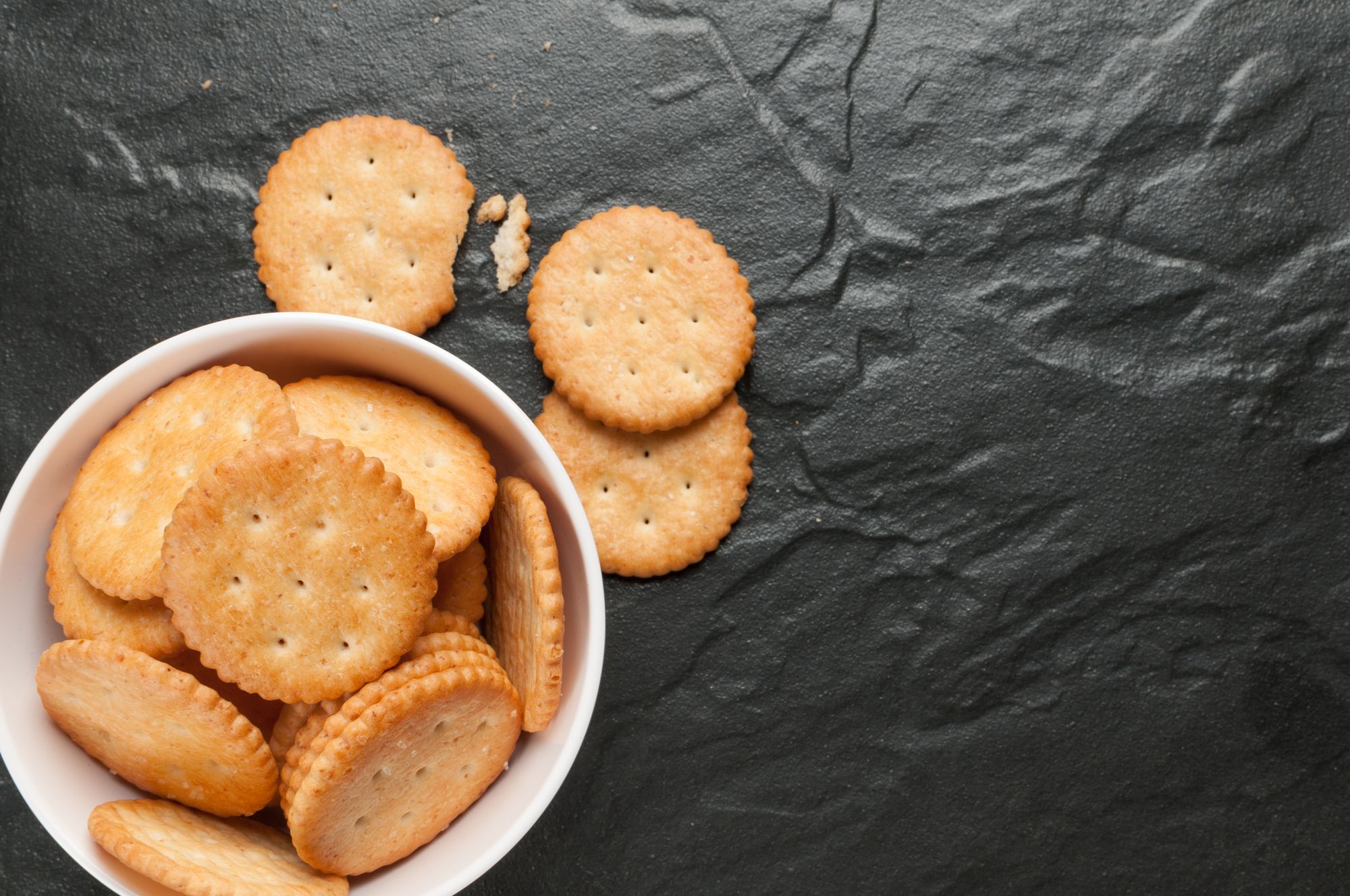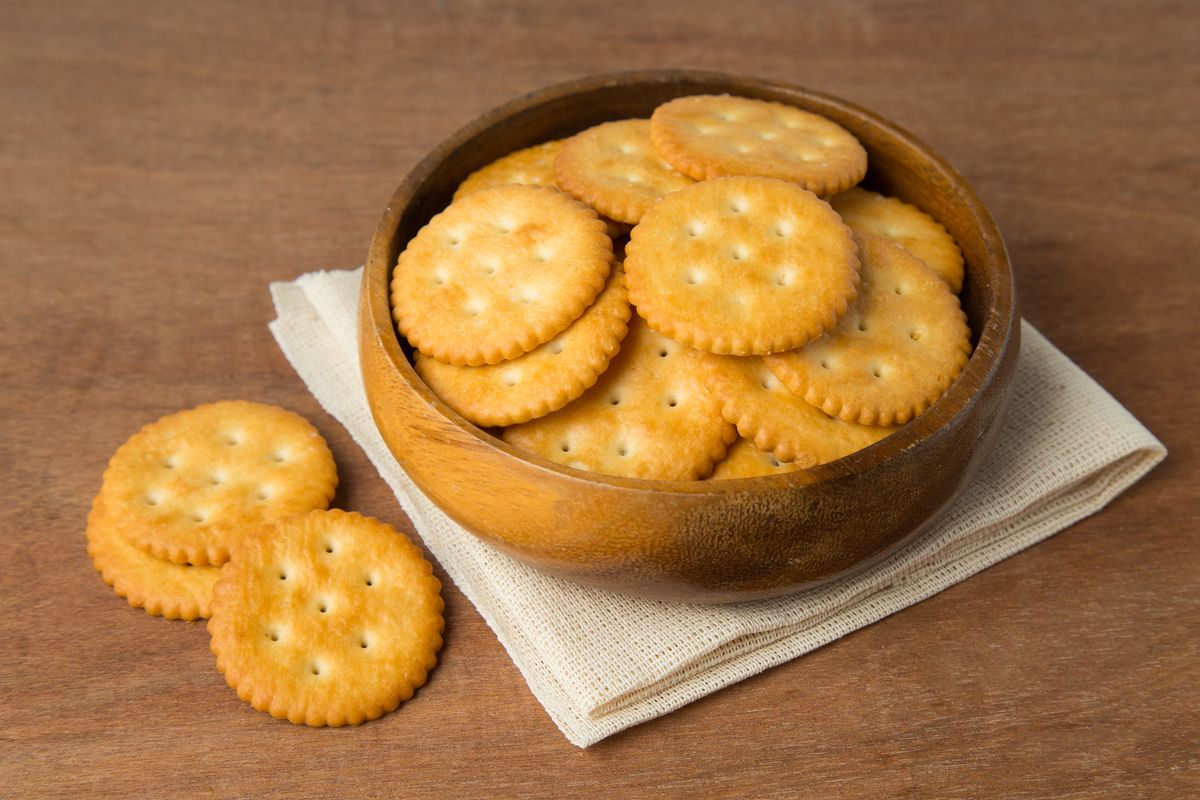Crackers are a popular and convenient snack option, whether you're on the go or looking to add some crunch to your charcuterie board or casserole recipes. However, not all crackers are created equal when it comes to nutritional value.
While many people may seek out crackers that are both delicious and nutritious, such as those made with whole grain ingredients and high in fiber and protein, some popular and affordable cracker brands are often made with heavily processed ingredients and low in fiber and protein.
Registered dietitians advise against consuming certain crackers due to their lack of nutritional value and high sodium and sugar content. For instance, crackers that are made with refined flour and added sugars, such as Ritz crackers and Wheat Thins, may lead to a spike in blood sugar levels and provide little nutritional benefit.
Other crackers that may not be the best choice include those that are high in sodium, such as saltines, and those that contain trans fats, which can negatively impact heart health.
Overall, while crackers can be a satisfying snack option, it's important to be mindful of the ingredients and nutritional value of the brands you choose to consume.
1) Ritz Cheese Sandwich Crackers
PER PACK: 200 calories (38 g), 11 g fat (3 g saturated fat), 310 mg sodium, 22 g carbs (0 g fiber, 5 g sugar), 2 g protein
Ritz crackers are a popular snack, particularly in their cheese sandwich pack form, which provides a convenient option for those on-the-go. However, nutrition experts have raised concerns about the low nutritional value of these snacks.
According to Toby Amidor, a registered dietitian and nutrition expert, a single snack pack of Ritz crackers contains 200 calories, 11 grams of fat, 3 grams of saturated fat, 22 grams of carbs, 5 grams of sugar, 0 grams of fiber, 2 grams of protein, and 310 milligrams of sodium. The crackers are also low in fiber and contain semi-soft cheese powder, which contributes to their high calorie and saturated fat content.
While Ritz crackers may be a convenient snack option, they provide little nutritional benefit and are high in calories and saturated fat. Nutrition experts recommend opting for snacks that are higher in fiber and protein and lower in sodium and added sugars to promote overall health and well-being.
2) Cheez-It Baked Snack Crackers
PER 1 POUCH (42 G): 210 calories, 11 g fat (2.5 g saturated fat, 0 g trans fat), 320 mg sodium, 24 g carbs (<1 g fiber, 0 g sugar), 4 g protein
Cheez-Its may be a popular and tasty snack option, but their nutritional value may leave something to be desired. While they are baked, don't let that fool you into thinking they are a healthy snack.
According to Lisa Young, a registered dietitian and author, a serving of Cheez-Its contains 8 grams of fat, 1.5 grams of saturated fat, 230 milligrams of sodium, and less than one gram of fiber. They are also made with refined grains and contain saturated fat, making them a less than ideal snack option.
In addition to their high sodium content, Cheez-Its are also fairly high in calories for a cracker. Young suggests opting for snacks that are lower in sodium, higher in fiber, and made with whole grains to promote better overall health and well-being.
While Cheez-Its may be tempting, it's important to be mindful of their nutritional content and consider healthier snack alternatives to support a balanced and nutritious diet.
3) Keebler Original Club Crackers
PER 4 CRACKERS (14 G): 70 calories, 3 g fat (0 g saturated fat, 0 g trans fat), 125 mg sodium, 9 g carbs (0 g fiber, 1 g sugar), <1 g protein
Keebler Club Crackers may seem like a harmless snack option, but the ingredient list tells a different story. While a serving of just four crackers contains 3.1 grams of total fat, 0.5 grams of saturated fat, 0 grams of fiber, and 0.8 grams of protein, the crackers contain several types of added sugars, including high fructose corn syrup, which can negatively impact overall health.
According to Toby Amidor, a registered dietitian and nutrition expert, it's important to choose snack options that are higher in fiber and lower in added sugars. Fiber is essential for regular digestion, weight management, blood sugar management, and heart health, so opting for fibrous snack options can help individuals reach their daily fiber goals.
While Keebler Club Crackers may be a convenient snack option, their high sugar content and lack of fiber make them a less than ideal choice for those looking to maintain a healthy and balanced diet. Nutrition experts recommend choosing snack options that are higher in fiber and made with whole grains to promote better overall health and well-being.
4) Ritz Crackers Original

PER 5 CRACKERS (16 G): 80 calories, 4.5 g fat (1 g saturated fat, 0 g trans fat), 130 mg sodium, 10 g carbs (0 g fiber, 1 g sugar), <1 g protein
The classic Ritz crackers, like many other processed snack foods, are often lacking in nutrients and contain unwanted ingredients.
Registered Dietitian Trista Best notes that Ritz crackers are made with refined wheat flour, vegetable oil, and added sugars, and are low in fiber and protein. This can make them less filling and contribute to overeating, ultimately making them a less ideal snack option. While it's okay to enjoy Ritz crackers in moderation as an occasional snack, they should not be relied on as a major source of nutrition in the diet.
For better overall health and well-being, Best suggests opting for whole-grain crackers or other nutrient-dense snacks like fresh fruits and vegetables. Choosing snacks that are higher in fiber and nutrients can help to promote a balanced and nutritious diet. While Ritz crackers may be a convenient and tasty snack option, it's important to consider their nutritional content and choose healthier alternatives whenever possible.
5) Nabisco Cheese Nips
PER 29 CRACKERS (30 G): 150 calories, 6 g fat (0.5 g saturated fat, 0 g trans fat), 210 mg sodium, 19 g carbs (0 g fiber, 0 g sugar), 3 g protein
Cheese Nips, a favorite snack for many, are known for their savory flavor, but they're not the best option when it comes to nutrition.
Registered Dietitian Toby Amidor notes that Cheese Nips contain a high number of calories and total fat. Additionally, they contain a significant amount of sodium, making up around 9% of your total recommended daily maximum.
Amidor suggests opting for a higher-fiber cracker or one with less added fat, and topping it with peanut or almond butter for a healthier snack option. Choosing snacks that are higher in fiber and nutrients can help to promote a balanced and nutritious diet, ultimately supporting overall health and wellness. While Cheese Nips may be a tasty option, it's important to consider their nutritional content and make healthier choices whenever possible.
6) Lance ToastChee Cheddar Sandwich Crackers
PER 1 PACKAGE (40 G): 200 calories, 11 g fat (3.5 g saturated fat, 0 g trans fat), 400 mg sodium, 24 g carbs (<1 g fiber, 4 g sugar), 3 g protein
One pack of ToastChee crackers contains 400 milligrams of sodium, which is about 17% of the FDA's daily recommended maximum intake for just one snack.
Registered Dietitian Trista Best notes that ToastChee Cheddar Sandwich Crackers, like many other processed snack foods, are low in fiber and protein while being high in sodium. This combination can contribute to several chronic health concerns such as weight gain, hypertension, and chronic inflammation.
To promote better health and wellbeing, Best recommends choosing snacks that are higher in fiber and lower in sodium. Incorporating nutrient-dense snacks like fresh fruits, vegetables, and whole-grain crackers can help to promote a more balanced and nutritious diet. While ToastChee crackers may be a convenient and satisfying snack option, it's important to consider their nutritional content and make healthier choices whenever possible.
7) Keebler Club & Cheddar Sandwich Crackers
PER 1 PACKAGE (39 G): 190 calories, 9 g fat (2.5 g saturated fat, 0 g trans fat), 310 mg sodium, 24 g carbs (<1 g fiber, 5 g sugar), 3 g protein
Craving a snack? Keebler's sandwich crackers may be tempting, but they don't provide much nutritional value. With 9 grams of fat, 2.5 grams of saturated fat, 310 milligrams of sodium, and less than one gram of fiber, these crackers won't keep you feeling full and satisfied.
However, you don't have to give them up entirely. It's important to note that any of the crackers on this list won't ruin your health goals, but choosing higher-fiber and higher-protein options will help you stay full longer and avoid overeating. So, next time you reach for a snack, consider opting for a healthier alternative.

